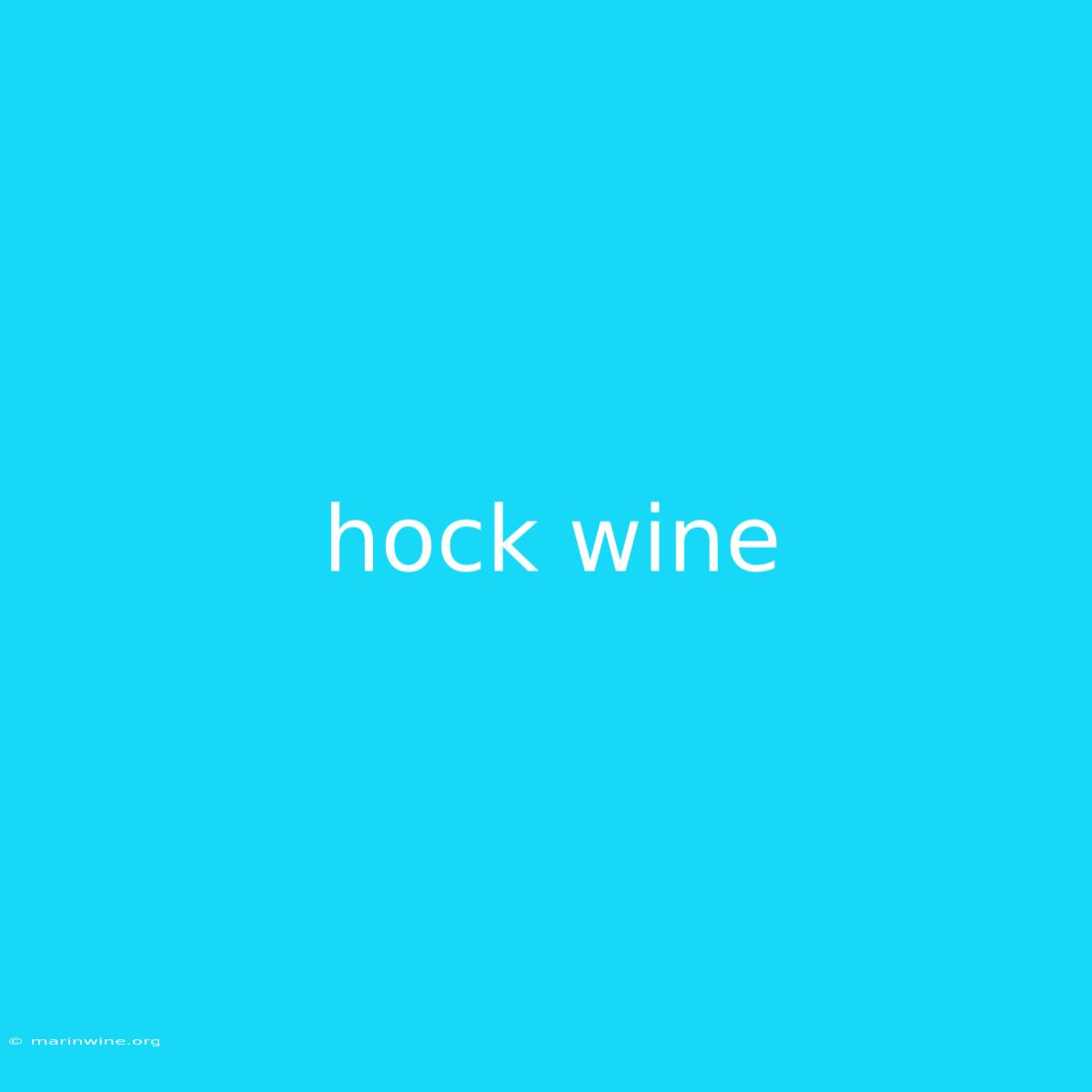Uncorking the Secrets of Hock Wine: A Journey into German Winemaking
Have you ever wondered what makes Hock wine so special? It's more than just a German white wine; it's a testament to centuries of winemaking tradition and a taste of the stunning Rhine region.
Why It Matters: Hock wine is a hidden gem in the world of wine, often overlooked for its more famous French and Italian counterparts. Understanding its unique characteristics can open up a whole new world of flavor exploration and appreciation for the art of German winemaking.
Key Takeaways of Hock Wine:
| Aspect | Description |
|---|---|
| Origin: | Primarily from the Rheingau region in Germany, with vineyards hugging the banks of the Rhine River. |
| Grape: | Primarily Riesling, known for its aromatic complexity and ability to age gracefully. |
| Style: | Dry to sweet, with varying levels of residual sugar depending on the vineyard and winemaker. |
| Flavor Profile: | Crisp acidity, delicate floral notes, stone fruit flavors like peach and apricot, and a hint of minerality from the slate soils. |
| Pairing: | Seafood, poultry, salads, Asian cuisine, and even spicy dishes. |
Hock Wine: A Deeper Dive
The Heart of the Rheingau
The Rheingau region, nestled along the Rhine River in Germany, is the birthplace of Hock wine. Its unique terroir, characterized by steep slopes, volcanic soil, and cool climate, plays a crucial role in shaping the character of the grapes. The vineyards, often overlooking the river, receive ample sunlight and benefit from the moderating influence of the water. This combination creates ideal conditions for Riesling grapes to thrive, producing wines with exceptional acidity and intense aromas.
The Essence of Riesling
Riesling, the heart of Hock wine, is known for its versatility. It can produce wines ranging from dry and crisp to intensely sweet, with varying levels of residual sugar. The unique combination of fruit flavors, acidity, and minerality creates a complex tapestry of aromas and flavors.
Exploring Different Styles
While the Rheingau region is renowned for its dry Riesling, the styles of Hock wine can vary widely. Some winemakers embrace a drier style, showcasing the crisp acidity and delicate fruit flavors of the Riesling grape. Others embrace a sweeter style, balancing the natural sweetness of the grapes with the refreshing acidity, creating a delightful contrast.
Hock Wine: A Culinary Adventure
Hock wine's versatility extends to pairing with food. Its crisp acidity and delicate fruit flavors make it an excellent complement to seafood, poultry, and salads. Its refreshing nature also cuts through the richness of spicy dishes, making it an intriguing pairing choice.
The Importance of Vintage
Vintage plays a crucial role in the quality and style of Hock wine. Cooler vintages often result in wines with higher acidity and more restrained fruit flavors, while warmer vintages produce wines with fuller bodies and more pronounced fruitiness.
Hock Wine and Its Future
Hock wine is experiencing a resurgence of popularity as wine enthusiasts seek out unique and authentic wines with rich history and compelling character. As the world becomes more aware of the complexity and versatility of this German gem, it's poised to capture the hearts and palates of wine lovers everywhere.
FAQs about Hock Wine
Q: What is the difference between Hock wine and Rhine wine? A: Hock wine is specifically made from Riesling grapes grown in the Rheingau region. Rhine wine refers to any wine produced in the Rhine region, including those made from other grape varieties like Pinot Blanc or Müller-Thurgau.
Q: Is Hock wine always sweet? A: No, Hock wine can be dry, semi-dry, or sweet depending on the amount of residual sugar. Dry Hock wines are often marked as "trocken" while sweeter versions are labeled as "Kabinett" or "Spätlese."
Q: How do I know if a Hock wine is good? A: Look for bottles with clear labels specifying the grape variety (Riesling) and the region (Rheingau). A good bottle will exhibit balanced acidity, delicate floral notes, and complex fruit flavors.
Q: How should I store Hock wine? A: Hock wine, especially dry Riesling, can age beautifully. Store it in a cool, dark place, ideally in a cellar or wine refrigerator.
Q: What are some good Hock wine producers to try? A: There are many excellent Hock wine producers, including Robert Weil, Schloss Johannisberg, and Dr. Loosen.
Tips for Enjoying Hock Wine
- Start with a dry Hock: Its crisp acidity and delicate fruit flavors will introduce you to the hallmark character of Riesling.
- Pair it with Asian cuisine: The refreshing acidity of Hock wine complements the subtle spices and flavors of Asian dishes.
- Look for wines with the "VDP" label: This signifies that the wine was produced under strict quality control standards.
- Experiment with different vintages: Discover how vintage influences the character and complexity of Hock wine.
- Explore other German wine regions: While the Rheingau is renowned for Hock wine, Germany boasts many other regions producing remarkable Riesling wines.
Summary of Hock Wine
Hock wine, a testament to the artistry of German winemaking, stands as a unique and captivating experience for wine enthusiasts. From its origins in the picturesque Rheingau region to the versatility of the Riesling grape, every sip offers a journey into the heart of German wine culture. As you explore its diverse styles, from dry to sweet, and uncover the intricacies of its flavor profile, you'll understand why Hock wine is a true treasure in the world of wine.
Closing Message: Uncork a bottle of Hock wine and embark on a delightful exploration of German winemaking tradition. With each sip, you'll discover the vibrant flavors and aromas that have made this region a revered source of some of the world's finest Riesling wines.

